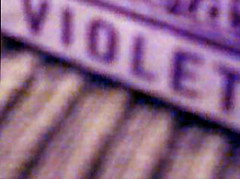Love's Labor's Lost. The Actor's Gang. 7/16/06.
Love's Labor's Lost is fairly strange for a Shakespeare comedy. It ends not with a wedding but a death and the promise of a wedding. There are fairly lengthy scenes of verbal jousting that can be dense and esoteric to a modern audience. And it has a play within a play scene that has almost nothing to do with the rest of the play. The Actor's Gang dealt with some of these issues, but also made some strange choices that didn't necessarily add to the comprehensibility of the play. They played up the bittersweetness of the ending and tried to emphasize the tragedy within the comedy, which left me feeling unsatisfied. The play itself has a fun premise, though it develops a bit oddly - the King of Navarre and three of his men swear to renounce women for 3 years to focus on their studies. As a grad student, I can certainly identify.
The high point of the show was the truly excellent performance of Brian Kimmet as Berowne. He was clear, expressive and delightfully clever. His monologue in which the men swear to renounce the company of women for three years and he argues for women and food as subjects worth studying was a hilarious introduction to the plot. All of the King's court, as a matter of fact, performed well, including Matt Huffman as the King of Navarre, who was working an almost Brad Pitt-esque jawline and a deep, authoritative voice.
In contrast, the low point of the show was the women who played opposite the King's court. Nancy Stone as the Princess, while an extremely skilled actress, was poorly matched with Huffman and in general seemed reserved and humorless, which takes a lot of the comedy out of this comedy. My biggest complaint was the costumes that the women wore, which were entirely sheer so that the women's underwear was visible throughout the show. While I can come up with a couple of slightly esoteric explanations for this decision (my favorite being that the whole production was seeing the world through the eyes of the men, and since they were sex-deprived and sex-obsessed, they were constantly looking at the women's panties), I honestly think it is a poor choice and completely misogynist to have the women walking around in their underwear throughout the show while their male counterparts wore business suits. From the moment they appeared and throughout the play I had absolutely no interest in any member of the female court. Though Sabra Williams as Rosaline did a great job with clarity and expression, and had the sassy power to be a super-fun character, the production seemed to undercut her in ways that prevented her from being a true match with Berowne. Even though she wasn't nearly as harsh, she seemed like a failed prototype for Beatrice from Much Ado About Nothing.
Similarly, the play within the play scene near the end of the show seemed like a not-as-successful version of the mechanicals play in A Midummer Night's Dream, but I believe that a lot of the humor was stripped out of it in this production by placing the horrible performance and its snarky commentators in the background with a foreground of actors preparing and the pathos of their hurt when mocked. Playing against the comedy in this scene makes it, and its inturruption by the Princess's father's death, a really disappointing ending to a play that began so promisingly.
This production had some fabulous moments, particularly the dance that opens the second half when everyone inexplicably dresses up as Russians. In fact, that scene was absolutely hilarious and made me happy with the production. But there were so many elements of the show that were misogynist or muddled that it's hard for me to recommend the play. It was especially irritating that there were several moments in which the language directly contradicted the action of the play (ie when Berowne asks about 'the girl in the cap' when no one was wearing a cap, when the King asks Berowne why he's leaving so quickly when he made no attempt to leave, or when one of the women talks about her lover being young and bare-faced when the actor is wearing a prominent fake mustache). If you're going to leave those lines in the play, you need to abide by them in the design and action or it doesn't make sense and distracts people from listening to the words at all. It was a serviceable, but by no means brilliant, interpretation of this problematic comedy. The Actor's Gang's commedia style doesn't work when it fights with the play's script instead of enhancing it, though there were some very funny moments and some stand-out performances. Toni Torres was a truly bewitching Jaquenetta, and Pierre Adeli as Costard was so earnest and funny that I wanted him to end up with the girl. Angela Berliner did a wonderful job as Moth, the witty servant, though stage business frequently undercut her lines and her unmasking herself as female at the end made no sense.
Overall, I have to question director Simon Abkarian's committment to the text of this play. The LA Times has an interesting article on who he is and his background, which sounds promising, but I don't think that it ultimately worked out. I do encourage people to go and decide for themselves, though, because while this production was problematic, it gave me a lot to think about and conceivably other people could like it a lot more than I did. And I am glad I saw the show, even though I didn't love it.
Zin Galactic cut
-
Zin Galactic cut
Sometimes there's something I like but I have to cut it because of how the
play functions better without it. I just cut this from Zin Gal...
7 hours ago

0 comments:
Post a Comment